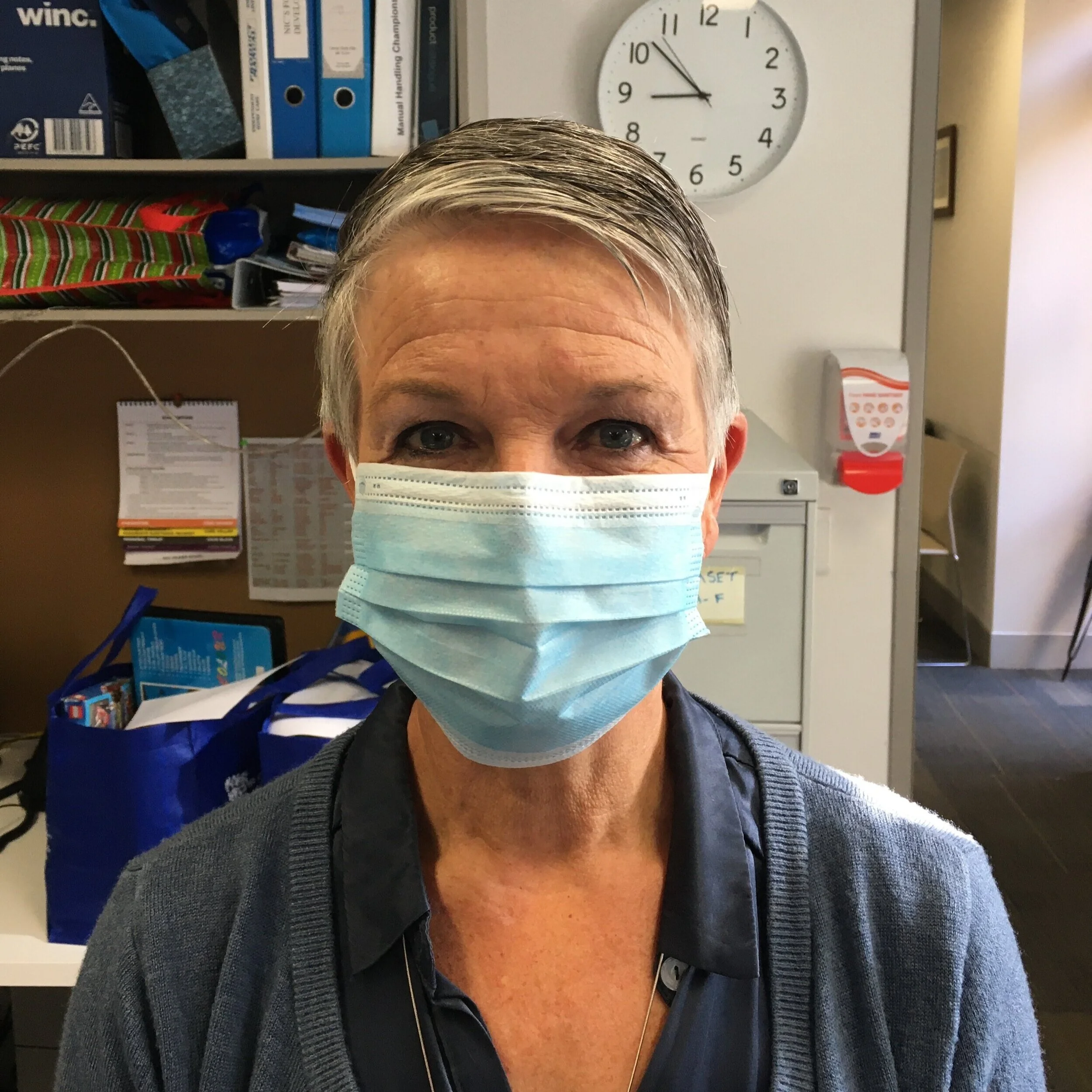Blog Post - "A Day in the Life of My New Normal" - Lis Murphy (April 2020)
Social work in a mask is different. (Lis Murphy)
It’s been just under a month since Covid 19 barged into my life. News of the virus had been hovering around for a while. In January 2020 I listened to reports about Covid in Wuhan, but at the time I was more focused on the fires that were ravaging our coastal communities. Then there were the reports about Italy, those images of health workers frantically treating dying patients haunted me to the point I had to stop watching the news. But it was the third week in March when Covid 19 really started to impact me directly. Three days before our local World Social Work Day Forum we were advised to cancel it as large gatherings were suddenly banned in Australia. Later that week our hospital started preparing for the Covid surge, our Intensive Care Unit (ICU) was expanded and as I was someone who had previously worked in ICU, I found myself assigned to the new Covid-19-specific ICU. It has been 3 weeks since I started working in that unit, and I wanted to share with you what my “new normal” looks like.
On my ICU days I wear a uniform, and for someone who studied social work in the early 80’s this feels sacrilegious! I have to admit though, I do love the scrub pants. They almost feel like I am wearing tracksuit pants at work, which, if I’m completely honest, has been a long held fantasy of mine! I am now in the practice of changing into my uniform when I get to the hospital. I then remove my uniform when I finish for the day, and as soon as I get home the uniform goes into the washing machine and I jump into the shower. I do this to ensure I don’t bring home any Covid-19 germs.
Another new ritual in my day is having my temperature taken when I arrive at the hospital. I am asked 3 questions, “In the last 14 days have you travelled overseas, have you experienced a fever, have you had contact with someone with Covid-19?” (I find this one weird considering I work in a ward with patients with Covid-19!). When I get to my desk I wipe down my computer keyboard, the telephone, the desk and chair… my office has never been so clean. I then check the electronic medical records (EMR) and note any new patients on the ICU ward. I feel relieved when I see that there is still a small number of Covid-19 patients.
Before I head to the ward our social workers all gather in the physiotherapy gym. This is another new ritual, where we check in with each other and share any changes that impact on our work. One major change has been how we support someone who is dying. Prior to Covid-19, social workers would support any number of family members to be with the dying person. Now if a non Covid-19 patient is dying, only two family members are allowed to stay for longer than the current 1 hour of visiting per day (one visitor per patient) but they require a “voucher” which will allow them into the hospital. If a Covid-19 patient is dying we may be able to facilitate a family member to be present but it depends on many factors like which clinical ward they are in, the preference of the nurse in charge of the ward, the family member (whether they have to been screened for Covid-19), is there enough Personal Protective Equipment (PPE) to spare, etc. These are just a few of the new considerations.
Don’t even get me started about whether we can conduct a viewing of a deceased Covid-19 patient! We are still waiting for official guidance on this matter. I find the current guidelines are still quite vague and more focused on infection control and handling the deceased body but do not answer practical questions like, where can we conduct a viewing, how many people can we allow to view the deceased person, how do we screen the family members for Covid-19, who wears PPE, do social workers supervise family to put on PPE, do we have to ensure no touching occurs, can we take photos for the family who are unable to attend the viewing? And so on. Thankfully, because we currently have capacity, a few of our social workers have been able to facilitate a viewing of a patient who has died of Covid-19 safely however, I realise that if we get the Covid-19 surge there will be no way we will be able to facilitate this anymore, and I feel really worried about the implications this could have on bereaved families. I wonder what is happening in London, New York or Milan? I suspect there are no viewings conducted but are any mementos of the deceased person being taken, like a handprint, a piece of hair or at the very least, or are photos being taken to give to the family?
In our ICU, social workers are the communication conduit between the families of the patient with Covid-19 and the staff. We are the people who make daily phone calls with the nominated family member and give an update, check in how the person is going and organise for the nursing and medical team to update the family at a nominated time. The other day I watched my social work colleague make a call to a partner of one of our Covid-19 patients. It was this delicate dance of acknowledging the distress of the partner in their separation from their loved one, and the collection of useful information about the patient that would help personalise their care. For instance, my colleague discovered that the patient loved music and that on their phone were Spotify playlists. She was able to convey this to the nurses who then played the music as they were providing the patient’s care.
Another example of my new normal is having my social work student work remotely. Despite her working from home she has been able to be actively engaged in her placement and has continued with her initial projects and continued some of the direct work by providing follow up to the families I have worked with in ICU. The other day one of my patients passed away suddenly leaving their partner who was a Culturally and Linguistically Diverse (CALD) woman on a temporary visa and with very little support. My student navigated various welfare services including Centrelink to organise financial assistance, a funeral and ongoing support. In addition, she has developed a Covid Emergency Services List to assist social workers in discharging people into the community which is no easy feat at the moment. Imagine for a minute how difficult it can be to discharge a Covid-19 patient home where they will need to isolate for two weeks. What do you do if that person has no support, how do they organise food, transport home, access to financial assistance? Yes, this is the bread and butter of hospital social work but the addition of Covid-19 and the impending economic crisis combined with services changing their processes, criteria, access, etc, has added extra layers of complications to discharge planning.
I want to end this piece with a few observations on positives that Covid-19 has brought to into my work life. I appreciate technology more, I use Zoom and Skype for clinical supervision and workplace meetings and intend to use it with families I work with in ICU (currently we are installing IPADS in the Covid-19 rooms). There is a noticeable collegiality amongst the staff within my hospital now. We smile at each other, hold doors open, share food that the community has dropped off, swap ideas about how to work differently with our patients and families. All of this has not only quelled my anxiety about coming into work but has made me feel proud to be working as a hospital social worker during this time.

